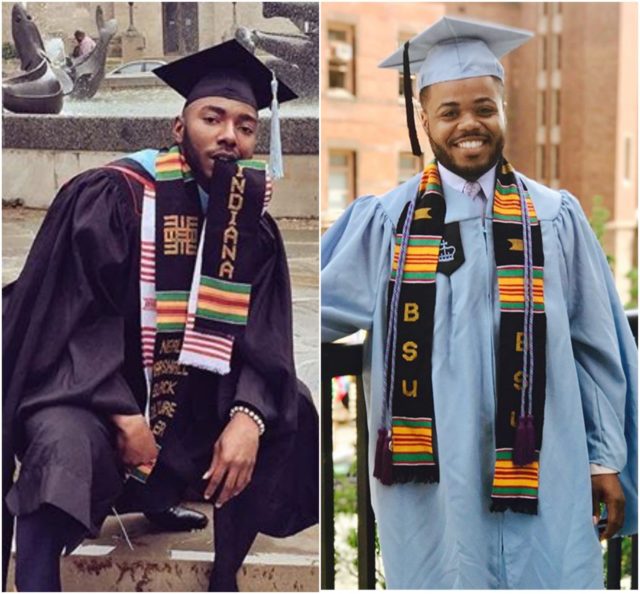“#BlackandHooded” founders Anthony Wright and Brian Keith Allen found an opportunity to celebrate the achievements of their peers in graduate programs while developing a network of Black academics via social media.
“After the hashtag went viral and people were posting all of their graduation photos online, Anthony came up with the idea of finding a way to not only sustain engagement with the Black academic community, but also give back and lift as we climb,” Allen said.
“#BlackandHooded” began with a phone conversation in 2017. Wright reached out to Allen just a few months before both of them would graduate from their respective master’s programs. Wright pursued his degree from Indiana University’s Higher Education and Student Affairs MS.Ed. program and Allen received his from Columbia University’s Higher and Postsecondary Education MA program.
At first, Wright did not have a clear plan, however, he knew he wanted to use social media to highlight the accomplishments of other graduate students. This idea would ultimately lead them to awarding several students with a $500 scholarship award and building a network of about 378 graduates from over 189 universities.
“After a phone call we settled on the name #Blackandhooded which we felt could be inclusive of Black graduate students across identity, background and experiences speaking directly to the idea that one, Black graduate students do in fact graduate, but also around a time where police violence plagued the nation, Trayvon Martin and him being villainized for wearing a hood was also a part of our mission to address larger systemic issues of police violence and brutality,” Allen said.
Wright and Allen planned to share opportunity as well. The scholarship came out of a desire to help alleviate some of the financial burden of prospective and future Black graduate students, in hopes of increasing access to the pipeline and diversifying academia’s many fields and disciplines. There have been two cohorts of four Black graduate students from institutions across the nation who have all received scholarships so far.
“The #BlackandHooded scholars have been up to some pretty remarkable things. We just had 3 scholars graduate with their master’s degrees and start jobs within their respective fields,” Allen said.
Many scholars, still in their programs, are conducting research, publishing in research journals, received fellowships and are active on their respective campuses like Natalie Reid, an award recipient from the inaugural cohort. After receiving a Bachelor’s in Comparative Human Development and a minor in Biology from the University of Chicago, she continued her education at the University of Michigan to obtain a Masters of Public Health.
Reid, originally from Milwaukee, said she saw the opportunity to network with other Black scholars across the nation. She said since becoming involved with #BlackandHooded her social media following expanded to Black academics.
“I think if anything, Black and hooded not only gave me that initial boost in academic life but it’s a great talking point,” Reid said.
She would often wear paraphernalia and attract questions from people who passed by. Reid used it as an opportunity to explain what #BlackandHooded was and to discuss her experiences in her master’s program.
For Black students in higher education, the experience can feel isolating at times. Reid said she felt like the sole voice for people who looked like her at times but fortunately she had the support of both Wright and Allen who went through masters programs before.
“For me, it’s really crazy. Neither of my parents has college degrees so I’m breaking generational barriers,” Reid said.
#BlackandHooded often helps those interested in continuing their education after college feel encouraged. Kiara Childs, Ph.D. student in the Department of Communications at UNC-Chapel Hill said seeing the images of other Black scholars made graduating feel possible.
“I was like one day this is going to be me. It’s going to be a long time but it was such an inspiration to see so many Black people getting ready to graduate and getting their degrees,” she said.
While Childs did not make as many connections with Black academics through #BlackandHooded, she said she felt assured she could make it through her doctoral program one day. She will embark on the third year of her program this Fall.
“I personally think #BlackandHooded is inspiring more than anything! It’s a testament of Black folks in academia being some of our ancestors wildest dreams come to fruition and showing younger generations that it is more than possible for graduate study to be an option if that’s the route you desire to take,” Allen said.
He said the biggest change since the inception of the movement has been the scope. The duo wen from retweeting graduation photos to coordinating an entire scholarship program. Allen said it has been both worthwhile and fulfilling.
“We are both looking forward to continuing supporting the Black academic community through our efforts to increase diversity and visibility of Black people in academia. We would love to increase the number of students we allocate scholarships to as well as the amount of money we provide,” he said.
Allen also said they would like to establish an ambassador program across different institutions where students can serve as references for future Black grads. Currently, Wright and Allen are fundraising and accepting applications for the next round of #BlackandHooded Scholars. All Black/Afrodescendant first-year graduate students are encouraged to apply.


































